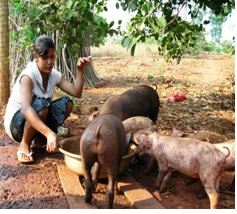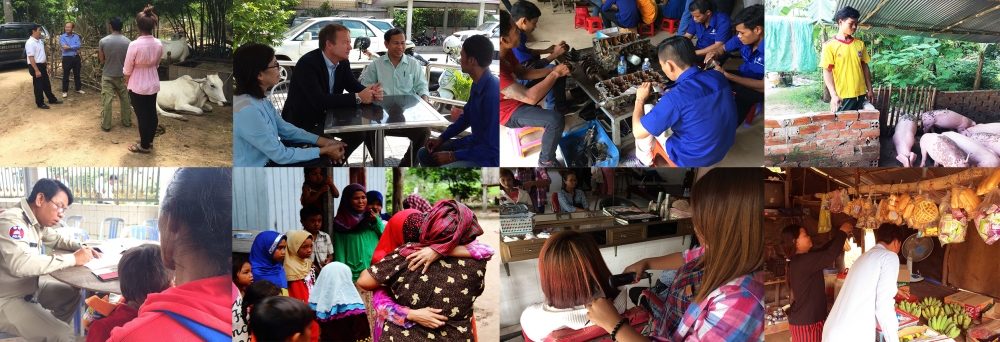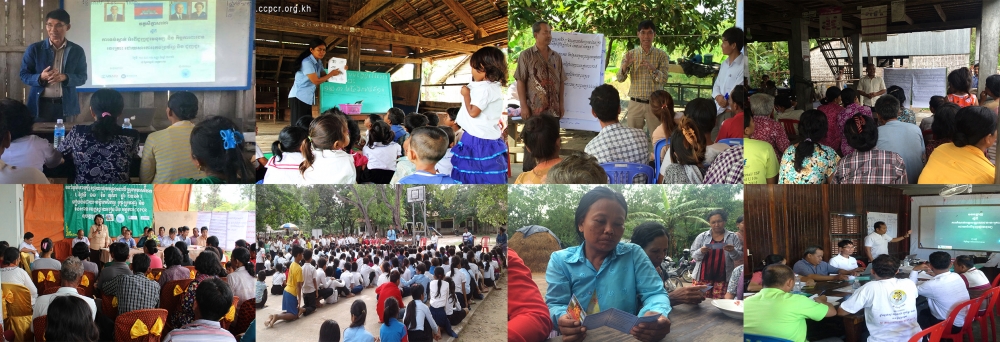Phase 3: Reintegration

CCPCR works to reintegrate or repatriate children back into their family, community or other relevant institution after the recovery period in the shelter.
CCPCR is in contact with the girl's family in order to discuss and assess the current situation in the household and/or community; this pre-assessment is shared openly with the girl. If the situation is found to be stable and safe, CCPCR recommends reintegration with the family as the first option. We take measures to ensure children will be safe and happy to live back with their family and/or community and whatever situation that caused the child to become at high-risk or a victim of abuse is removed or resolved.
With the support of the reintegration officer, cases choose whether or not to return to their family. Should CCPCR's pre-assessment be unfavorable and/or the girl does not wish to return to her family, other options are sought out for them. If she decides to stay in Svay Rieng Province or Phnom Penh, CCPCR assists her in locating housing, finding employment, and other basic issues of reintegration.
CCPCR can also offer safe housing in the Transition House in Siem Reap to girls who are in the process of being reintegrated. The girls can work and get trained at the house in jewelry making and design, whilst receiving subsidized housing, assistance and support from staff. Read more about the Lotus House in the Latest News section.
CCPCR has also set up a Targeted Reintegration Support Fund for beneficiaries. Through this fund, each girl has $125 available to her. This fund, however, remains under the control of CCPCR and cannot be accessed independently by the girls. Following reintegration, each girl can request this money to be used on her business venture.
If the cases doses not wish to establish her own business, support is provided to find employment. CCPCR conducts pre-assessments with network partners, private businesses, and other institutions to find job opportunities for the girls. It is ensured these jobs are safe and that they are exploitation free.
Regardless of whether a girl chooses to return to their family or reintegrate into employment, CCPCR follows-up with monthly visits for at least the first three months after leaving the shelter project. The aim of this process is to analyse cases situation and ensure their safety and progress is being maintained. Certain circumstances may require more frequent follow up visits. Later on, when cases are more settled with the reintegration option, visits follow at six months, and continue as needed.
The main aims of the reintegration phase are to:
· Assist the girls to settle into normal society and independent life.
· Facilitate home visits with reintegrated children in order to counsel parents or relatives who have accepted the children.
· Assist children to find suitable work if necessary
· Provide children with financial assistance or equipment related to their skills, to assist them to earn income upon their departure from the shelter.
· Establish and manage revolving funds for children to access if they wish to start their own business. Children repay the loans once financially secure.
· Work collaboratively with the International Organization for Migration (IOM), Embassies and Ministry of Social Affairs, Veteran and Youth Rehabilitation (MOSAVY) to reintegrate those children trafficked into Cambodia from other countries.
Some results from last year’s reintegration:
· 243 cases were reintegrated back with their families/community with support, school materials, clothes and basic needs.
· 132 cases were supported to attend public school, following reintegration, whilst they lived with their families.
· 13 cases were reintegrated to stay in our halfway house in Siem Reap, to work on a small sewing business
· 80 cases from the halfway house were employed in businesses, with entrepreneurs and factories.
· 185 job assessments concerning the employment of cases were made
· 305 cases received follow-up suport
Activities
- Child Pursues Education, After CTIP Supports on Business to Family
- Vulnerable People sharing Experienced on Benefit of Raising Chicken
- Helping Vulnerable Families Improve their Lives
- Trafficking Survivor Sharing Experience of migration
- My Dream Came True as a Barber
- Former Trafficked Victim Got supported to Improve Livelihood
- Livelihood Supported to Pursue Hope
- “My Dream Come True with Hair Dressing and Salon Business”
- Rice Bank Met the Need of People to Stop Risky Migration
- Pig Raising to Improve livelihood of Survivors
- "Cows Bank", is the Resource of Sustainable Livelihood
- We Together to End Human Trafficking
- From Miserable Life to Get a Skill of Hairdressing
- SVG Trained Beneficiary to Be Sustainable Farmer
- Local Leaders Share Lessons Learned and Plan for Sustainable Anti-Trafficking Efforts
- Successful Collaboration to Return 33 victims from Vietnam
- Survivors of Labor Trafficking Receive Support to Pursue Safe and Sustainable Income Sources
- CCPCR Conducts a Chicken and Pig Raising Training for Capacity Building
- 23 Labor Trafficking Victims Were Back to Community Successfully
- Chinese Guests Visited CCPCR to Hear Experience of working with Human Trafficking Victims
- AOI's Students Visited Child Prevention Project
- Collaborative Effort Leads to Successful Repatriation of 54 Cambodian Men Trafficked to Fishing Boats
- Risky Migration Lead to Trafficking Issues
- Livelihood Training Workshop on Chicken and Pig raising to Victims and Victims'family
- 15 Survivors Returned back to Community With New Life
- 4 victims of human trafficking from Vietnam, Returned Back Successfully
- Eleven Trafficked Children to Beg in Vietnam, Returned to Cambodia
- CTIP Secures the Second Chance at Education for 22 Trafficked Children Forced to Beg in Vietnam
- National Verification Process in Thailand
- Press on After Trafficking Launch
- Angkor Wat Bike4Kids! Event
- Radio Australia Broadcast
- Featured in Global South Development Magazine
- A major fundraising campaign for CCPCR!
- CCPCR's Christmas party!
- Painting in Phnom Penh!
- Sihanoukville Shelter - Can you help?
- Lotus House - Siem Reap
Download Document
- Local Leaders Share Lessons Learned and Plan for Sustainable Anti-Trafficking Efforts
- Successful Collaboration to Return 33 victims from Vietnam
- 2015 Annual Report
- Snapshot-Forum Empowers Human Trafficking Survivors to Make Recommendations to Policymakers and NGOs
- Snapshot-Survivors of Labor Trafficking Receive Support to Pursue Safe and Sustainable Income Source
- CCPCR’s Prevention Activities for October
- CCPCR CSO Certificate certified and approved by Minister of Ministry of Social Affair
- Case study - IOM training on representatives of 14 child clubs
- 2014 Annual Report
- Case study - Child Club in Thmei commune
- Case Study - Teng Mao Community
- Case Study - Training on pig farming in Thnout commune
- Case Study - Community Learning Centre in Chres commune
- Case Study - Parental Group in Tuol Ampal village
- Case Study - Child Club in Kandal Village in Thnout
- More than just victims- the truth about human-trafficking
- What are you grateful for?
- Shelter Appeal
- CCPCR's Rehabilitation strategy
- Organizational Chart
- CCPCR's Child Protection Policy
- Human-trafficking in Cambodia
- Human Trafficking FAQ's
- Statement for human rights day, December 10, 2014.
- Current situation on process to migrate to Thailand in EN
- Current situation on process to migrate to Thailand in Kh
- 2013 Annual Report
- 2012 Annual Report
- Svay Rieng Shelter
- 2011 Annual Report
- 2010 Annual Report
- Svay Rieng Presentation 2010
- CCPCR's Rehabilitation strategy



